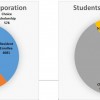Background
Indiana passed its school voucher law in 2011. It’s considered one of the most expansive in the country because students don’t have to attend a failing school to be eligible for the statewide program. Legislation proposed during the 2013 session would make siblings of current participants also eligible for vouchers, tweaking a rule that required students to first attend a public school to receive state money for private school.
School vouchers allow a student to take state money — normally distributed only to public schools on a per-pupil basis — to a private school of his or her choice. (Additional funds allocated for students enrolled in free and reduced lunch programs are non-transferrable.)
During the 2011-12 school year, 3,919 students received vouchers to attend a private school of their choice. There were 7,500 vouchers available in the program’s first year. That amount doubled for the 2012-13 school year, and that cap disappears in 2013-14.
School choice advocates have praised Indiana’s program for reaching into the middle income levels: A family of four making up to $62,000 per year could get a partial tuition scholarship from the state to attend a private school. Supporters of Indiana’s voucher program say parents and students benefit when they have a choice of schooling options.
Vouchers are often seen as complementary to or even synonymous with the charter school movement. But there are significant differences. Charter schools are publicly funded, cannot charge tuition and are bound to many of the same constitutional limits placed on traditional public schools. Private schools can charge families tuition above and beyond what the state will cover and aren’t bound by many of the constitutional limits placed on charter and traditional public schools.
This is the most common source of criticism leveled against the voucher program. Most private schools in Indiana are run by religious organizations and feature religious themes in their curricula. Critics point to this as a direct violation of both the First Amendment of the United States Constitution and Section Six of the Indiana State Constitution, which specifically forbids Indiana from using state funding to support religious institutions.
In March 2013, the Indiana Supreme Court rejected a legal challenge to the state’s voucher law, upholding the earlier ruling of a Marion County judge. They ruled the program didn’t use state dollars to promote religion, as it was parents — and not the state — determining which schools receive vouchers. Though current state schools chief Glenda Ritz opposed the voucher program on the campaign trail, she has said she would “faithfully administer” the program.


